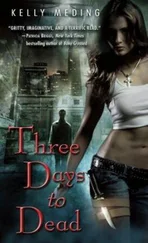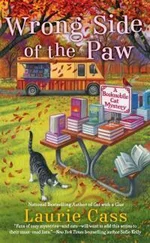In some ways, I missed talking to his big, cement head and the sound of his wind-through-reeds voice. He was part of the earth, moved through it like a fish through water, and had given me a lot of good information over the years.
“Stone?”
I looked at Baylor. “What?”
“Thoughts?”
I almost said no, all of my informants were out of town. And then it came to me, so obvious I almost laughed. “Do you know which factory the gremlins were moved to last month?”
“Yeah, why?”
“You want information? Where’s the nearest bakery?”
8:15 A.M.
The city’s entire population of gremlins used to inhabit a defunct potato chip factory on the outskirts of Mercy’s Lot, surrounded by other factories both functioning and abandoned. For several square city blocks, you could travel through a veritable boneyard of the industrial age. We even had an old ironworks-turned-fancy restaurant on the Black River, where iron and steel were once shipped south during a very different time period.
Almost two months ago, Gina Kismet had convinced the gremlins to move to a new factory, and then promptly tried to blow me up in the old one. I survived (barely), and the gremlins had brand-new digs near the docks to nest in and fill up with vats of their alcohol-like piss. Why they saved it, instead of just peeing on the ground, was way beyond me. The new factory was larger than the old one—longer and narrower, about four stories with lots of papered-over windows, and a tall chain-link fence surrounding it, complete with razor wire on top.
Baylor parked alongside the fence, on the factory’s river side, near what had once been a gate and guard hut. He climbed out and walked into the hut. With his van door still open, I could hear him say “Ballengee be blessed” to someone. It was a familiar greeting.
The gate buzzed, then hummed with electricity. It rolled sideways along a track I hadn’t noticed, giving us entrance.
“I’ll be damned,” I said. It seemed the gremlins had learned to use technology to their advantage rather than simply destroying it in service of chaos.
We drove across a narrow strip of parking lot. A garage door opened in the side of the factory, and Baylor took us right inside the building. The interior was dim, lit only by the natural light filtered through the covered windows. The majority of the open factory stretched out to our right, blocked by a wall of … well, stuff. Boxes and metal siding and old tables all stuck together like the world’s most bizarre honeycomb.
“Everyone but Evy stay inside the van,” Baylor said.
I got out first, and was struck by the familiar and nauseatingly gross odor of gremlin piss. It smelled like too-sweet liquor left to warm in the sun—or in the baking factory, in this case. Maybe gremlins liked heat, I don’t know, but summertime and the lack of working air-conditioning combined to make sweat break out across my face and neck.
The noise came last. Thousands of scurrying feet and raspy, high-pitched voices speaking a foreign language of their own design. It was raucous, and it echoed in the cavern that was their new home. I wanted out—now!—but held my ground.
Baylor and I unloaded six boxes from the back of the van—four cheesecakes and two boxes of jelly-filled do-nuts. Gremlins lived on an entirely sugar-based diet, and providing sweets was the best way to curry a favor. We placed the boxes in a row near the three-foot hole that tunneled through the city-dump wall. It had to be their front door. There was no other way past the barrier.
Long, hot minutes passed. Sweat trickled down my back, and I longed for the air-conditioned comfort of the van. Finally, a gremlin emerged from the hole. Twenty inches or so tall, the creature had long, spindly arms, knobby knees, and wrinkled yellowish skin. Green fur tufted from its long, rabbitlike ears and covered its round head. Its red eyes moved from the food, to us, to the van, then back to the food. This gremlin wasn’t as old as the first one I’d met, but that gremlin was long dead. Their life spans were about eight days.
“New,” it said to Baylor.
“Yes, we have not met. But your people have met my companion.”
It eyeballed me, then pointed one clawed hand at the bakery boxes. “For what?”
“Payment for a favor,” I said.
“Ask.”
“I need information on a human male named Walter Thackery. He consorts with half-Bloods, humans who have been bitten by vampires. He also consorts with men who shift into wolves. Lupa.”
The gremlin nodded.
“We have to find Thackery. He’s hurting people, and he’s our enemy. If any of your people have heard talk, or seen these creatures congregating anywhere in the city, will you tell me?”
“Yes, will tell.” It licked drool from its wide lips, displaying two rows of tiny, pointed teeth. “Eat. Learn.
Tell.”
Okay, this was promising. The gremlins were small, gross, and decidedly inhuman, but their intel was always accurate. Deception wasn’t something they understood. They needed food; they traded favors for food. Sweet and simple. “When shall I return for this information?”
“Meet. Old home. Three hours.”
“All right. Thank you.”
It made a noise in its throat. Half a dozen gremlins swarmed from the hole, grabbed the boxes of treats, and disappeared just as quickly as they had come. The gremlin who greeted us waited until the last one was gone, then followed it inside. Summary dismissal.
“Do you trust them to do what they say?” Paul asked once we were outside the factory gates and had explained the plan to him.
I twisted around in my seat and leveled him with a glare. “The gremlins have never betrayed me.”
He made a sour face.
The phone I forgot I had on me buzzed in my back pocket. Damn thing was small. I pulled it out, not surprised to see Kismet’s name on the I.D. My heart skipped a beat anyway. “Stone.”
“What’s your status?” she asked.
“Leaving the factory. If the gremlins know anything, they’ll tell us in three hours. Anything new on your end?”
“So far no new illnesses among the vampires. We’re talking to them, trying to find a common connection between the ones who are sick and the ones who aren’t.”
I repeated that for the group in the van. “Nothing on the missing Therians?”
“Not yet, no. Speaking of, Astrid chewed me out for letting you off the premises during an unofficial quarantine.”
Oops. “What did you say to her?”
“I threw the word ‘unofficial’ back in her face and said, ‘Thanks to Evy there are two fewer werewolves in the world.’ It shut her up.”
Laughter bubbled up inside, but I kept it down. A well-oiled machine we were not.
“Then she made the quarantine official,” Kismet said. “Everyone who’s in the field now is all we have until she, Dr. Vansis, and the vampire Fathers are convinced the infection won’t spread.”
“Terrific.”
I repeated that, too, to a chorus of soft groans from the other passengers. Backup, weapons, technology—so many things now completely inaccessible to us. That sucked big-time.
“How’s Wyatt?” I asked. Her silence sent tremors through my stomach. “Gina?”
“He got worse fast, Evy. His temperature shot up two degrees, and his blood pressure spiked. Dr. Vansis induced a coma a few minutes ago.”
A dull roar filled my ears. I pressed my forehead against the cool glass of the passenger window and closed my eyes. Nothing felt real. “Why?” was all I could manage to squeak out.
Kismet’s own voice was tight when she replied. “The Assembly’s information was pretty useless. No one did viral analysis five hundred years ago, but his symptoms match what’s been noted. Dr. Vansis explained it with bigger words—”
Читать дальше












